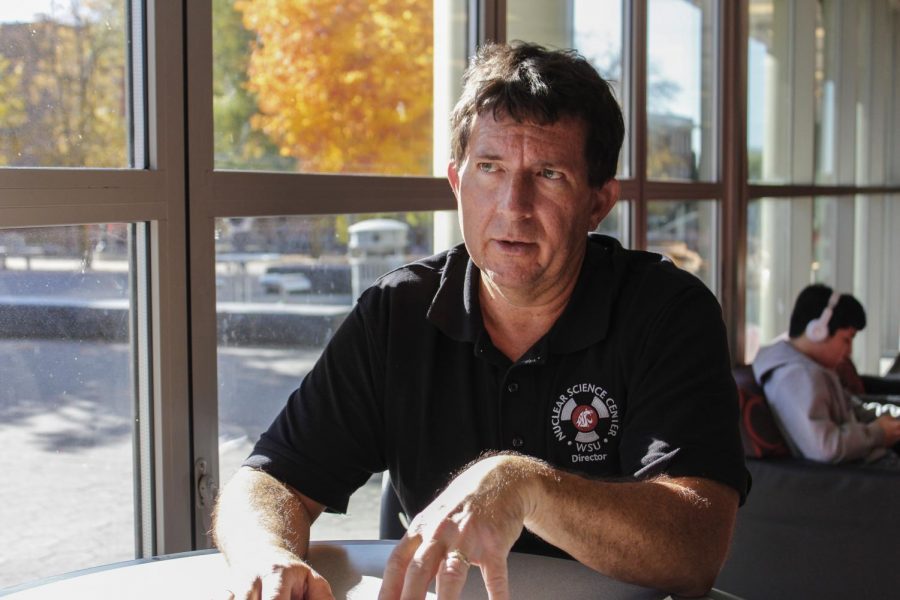Political correctness necessary for peace
Public officials should know how to work with diverse groups, respect other cultures if they are to negotiate
EUGENE LEE | THE DAILY EVERGREEN
Donald Wall, the director of the WSU Nuclear Science Center, discusses the implications of North Korean production and testing of nuclear weapons Tuesday in the CUB Lounge. Dealing with other countries requires respect and intelligence.
October 25, 2018
Politicians have long been politically correct to safeguard peaceful intentions and demonstrate their understanding of others, but it’s fallen out of favor in recent times.
Contemporary society is a place of diverse cultures, complexly interwoven with perspectives of all kinds. Both domestically and internationally, political correctness is used to recognize and respect these intricate social ties.
But some people believe you can give too much respect and that respect is not always the best course.
President Donald Trump is certainly one of those people.
“North Korean Leader Kim Jong Un just stated that the ‘Nuclear Button is on his desk at all times.’ Will someone from his depleted and food starved regime please inform him that I too have a Nuclear Button, but it is a much bigger and more powerful one than his, and my Button works,” Trump wrote in a tweet on Jan. 2.
This was the last in a series of inflammatory tweets dating back months regarding the North Korean nuclear issue.
To many onlookers, it appeared Trump would be the first president to instigate a nuclear war and many West Coast citizens within the potential range of North Korea felt ill at ease that a dictator had both the capability and cause to issue a nuclear strike.
Many were then surprised by the announcement of peace summits.
Beginning April of this year and continuing to today, there has been more progress made on this front than ever before. Trump is even credited with having greatly influenced the initiation of these talks by Kang Kyung-wha, South Korea’s Foreign Minister.
While Trump certainly instigated these talks, there was much more at play that brought them to be.
At a size roughly equivalent to Pennsylvania, North Korea is a relatively small country surrounded by world powers such as Russia, China and Japan.
It’s for these dispositions of power that North Korea sought and achieved nuclear armament — a nuclear deterrent, as much needed by them as it was by France after World War II.
“North Korea is not another ISIS. They are a strategic, rational people,” said Yong-Chool Ha, Korea Foundation professor at University of Washington, in a Foley Talk on Tuesday.
North Korea doesn’t seek the destruction of other nations or peoples — they only seek the protection of their own, he said.
“Could nuclear weapons reach Seattle?” Ha said. “Theoretically, yes. Politically, it is unlikely.”
There is yet to be any conclusive evidence on whether North Korea has the means to threaten the U.S. nuclearly, but what is certain is that it is rapidly progressing toward that point.
“The guy that I know went into [North Korea’s] nuclear lab where they have the plutonium they’re going to put in the weapon … and asked ‘Could I hold it please?’ and he puts it into his hand, and it’s warm,” said Donald Wall, director of the Nuclear Science Center at WSU.
Since Kim became Supreme Leader of North Korea in 2011, 62 nuclear launch tests have been conducted, Ha said. Estimates of their destructive potential increased with each one.
North Korea and the U.S. both recognize this, so to prevent the situation from reaching critical mass, Trump began his campaign to force Kim and his officials to participate in peace talks using public humiliation.
Though this tactic worked to reach present ends, it will not have a welcome place in further talks.
Trump’s administration demanded a faster approach, giving shortened periods ranging from six months to a year for this process. North Korea has agreed to dismantle some of their facilities, but only so long as the U.S. does the same.
Here and now, respect is needed to develop relations with North Korea.
Trump is well-practiced in doling out humiliation and promises of fire and fury; now is a time for support and patience, a time in which political correctness shines.
While the social grace of our president is out of anyone’s hands but his, we should recognize that while disregarding what is proper and respectful is sometimes best, political correctness is essential to fostering peaceful relations.
For this, we should learn and practice being politically correct in our own lives, if not for any other purpose than to find the peace that flourishes in it.
Centuries of peacemakers have found success by their ability to carefully articulate and consider those they work with.
If peace is what we pursue, then we should appoint those who best practice political correctness to represent our nation in delicate international affairs like what we find with North Korea.





















